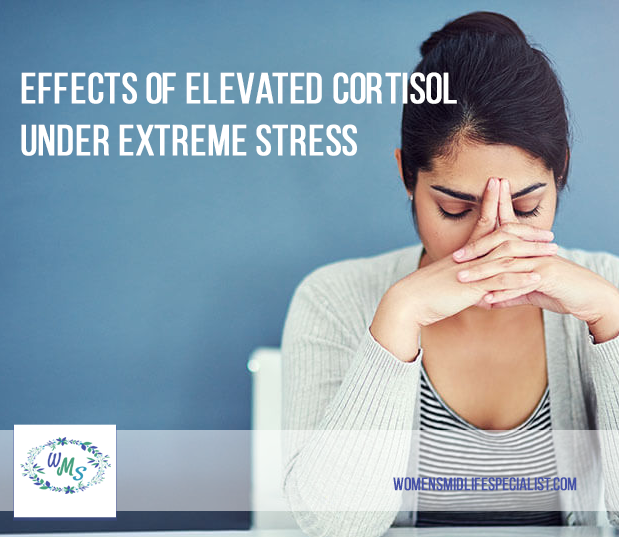Effects of Elevated Cortisol Under Extreme Stress

Cortisol is a hormone released by the adrenal glands. It is a vital hormone for daily function and plays a plays a major role in:
1. Proper glucose metabolism.
2. Metabolism of protein, fats and carbohydrates.
3. The inflammatory response.
4. Regulation of blood pressure.
5. Regulation of cardiovascular function.
Cortisol is also the very hormone that is secreted when we are under sudden extreme stress, known as the flight or fight response. When we are exposed to a situation that requires bodily functions that far exceed our daily needs, ACUTE spikes in cortisol result in stimulating body functions to overcome the acute stress.
Under these acute extreme situations, cortisol release results in immediate release of fats and glucose into the blood stream, where these fats and glucose can be utilized quickly by the cells for needed fuel. Acute spikes in cortisol, also results in elevations in blood pressure and heart rate. It also stimulates the breakdown of muscle for additional opportunity to increase blood glucose.
When cortisol is quickly released into the blood stream, concentration and awareness also rise suddenly.
This flight or fight response has helped man survive through the most stressful times. In fact, acute episodes of cortisol release can be life saving and is not a problem to the body!
The problem lies with chronic cortisol secretion.
Symptoms of chronic elevated cortisol include:
1. Fat around the middle
2. Difficulty falling asleep and poor sleep in general
3. Waking up to urinate
4. Difficulty increasing and / or maintaining muscle mass
5. Decreased libido
6. Decreased testosterone levels (as cortisol and testosterone compete)
7. Desire to eat sugar
8. Need to drink coffee
9. Sluggish feelings in the morning
10. Thin skin
Cortisol is an excitatory hormone. It arouses us and wakes us up. Blood levels of cortisol have been shown to increase within thirty minutes of waking which arouses us to wake up and get us moving in the morning.
Cortisol levels should decline as the day wears on and reach their lowest point in the evening, allowing us to rest, relax, and sleep.
However, when cortisol levels are affected by the conditions of prolonged chronic stress, chronic over secretion of cortisol leaves us chronically hyper-aroused.
When we're chronically hyper-aroused, we can't sleep, and the sleep we do get is not as restful.
Our Hormones also play a huge role in our sleep.
As Progesterone declines in midlife, the FIRST thing most women notice is a decline in the quality of their sleep. It usually gets worse and worse until eventually You’re Praying for a just one good night.
ProgesterONE is our AMAZING Sex Hormone that unfortunately is the first Sex Hormone to decline.
And it does so when we are just Spring Chickens - in our late 30's! And it just continues to plummet for the next 10-15 years until we're almost completely depleted of ProgesterONE!


Leave a comment